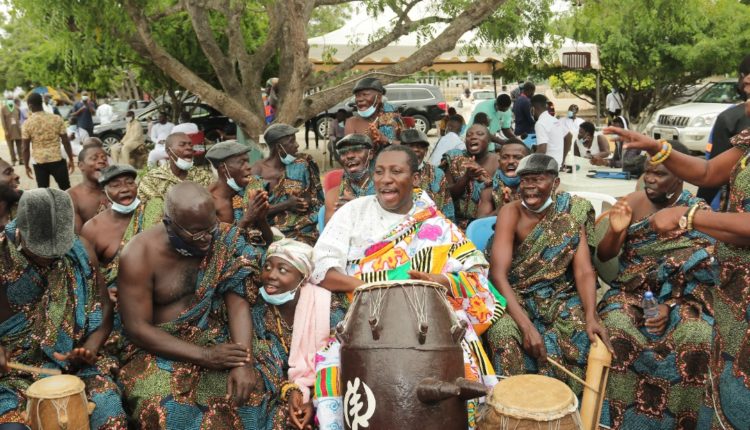Deputy Majority Leader in Parliament and Member of Parliament for the Effutu Constituency, Alexander Afenyo-Markin, momentarily became an ambassador of Ghana’s rich culture and tradition during the opening ceremony of the Delocalised Meeting of the Parliament of the Economic Community of West African States (ECOWAS), ongoing in Winneba, the capital town of his constituency yesterday morning.
Dressed in traditional kente, Afenyo-Markin thrilled his colleague Parliamentarians to several performances of various traditional Ghanaian music and dance during the ceremony and at a point he even took over the drums of one of the indigenous Effutu traditional music groups, OMPE, to show his skills on the traditional drums.
He drummed, sang, danced and told his guests of the rich traditions and culture of the Effutu people.
His Excellency Sidie Mohamed Tunis; Speaker of the ECOWAS Parliament, third Deputy Speaker; Memounatou Ibrahima, and the President of the ECOWAS Court; Justice Edward Amoako Asante and some 25 Members of the West African body from across the sub-region plus some of its very top officials are all in Winneba for the 5-day meeting.
Also present at the opening ceremony were President of the Effutu Traditional Area; Neeyi Ghartey VII and the Minister for Central Region, Hon. Justina Marigold Assan.
Ghana’s Speaker of Parliament, Alban Bagbin, in his address to officially open the meeting expressed gratitude for being invited to the gathering of the ECOWAS Joint Committee on Political Affairs, Peace, Security and Africa Peer Review Mechanism (APRM), Legal Affairs and Human Rights, and Telecommunications and Information Technology.
It would be held under the two themes- telecommunication and regional security.
Speaker Bagbin said it is encouraging that despite the tensions and the violence that characterise the conduct of elections in some countries, electoral candidates who are dissatisfied with either the process or outcome of elections are increasingly resorting to the use of the constitutional courts in those countries to resolve electoral conflicts.
“Unfortunately, the judicial system in some countries in the sub-region is slow in the administration of justice. Indeed, the deployment of telecommunication and information technology tools provide the judiciary the opportunity to dispense justice in a more accessible, transparent, efficient, timely, and accountable manner. It is for this reason that the Judiciary in Ghana, for instance, introduced the Electronic Case Management System to expedite court processes”, he added.
Bagbin continued: it is no gainsaying that telecommunications and information technology is fast becoming a driving force in today’s digital ecosystem by seamlessly connecting communities, businesses and governments. It is therefore more imperative now than ever to deploy the use of telecommunications and information technology to advance all sectors of one’s economy and also promote the development of the sub-region.
“Technology and ICT are indeed very useful and critical in propelling our sub-region forward, whether in the area of peace, development, education, health delivery, agriculture, etc. We must however bear in mind that whilst technology is extremely good for development, the human touch cannot be replicated. Thus, whilst we strive to inject a lot more technology and ICT into our approaches, we should bear in mind the quote by Lyndon B. Johnson, Former President of the United States of America, which reads “If future generations are to remember us more with gratitude than sorrow, we must achieve more than just the miracles of technology. We must also leave them with a glimpse of the world as it was created, not just as it looked when we got through with it.”
AFENYO-MARKIN
Alexander Afenyo-Markin in his opening remarks emphasised the crucial importance on ICT in the development and advancement of every economy.
He said the world now lives in the age of revolutionary Telecommunication and Information Technology.
“This is the age where doctors perform invasive but critical life-saving surgeries remotely with the aid of high-speed internet, computers and advanced medical tools, equipment and gadgets. This is the period where advances in Artificial Intelligence and Machine Learning have made it possible for some countries to deploy Robots, instead of human judges, to make accurate and binding judicial decisions in the Courtroom”, Afenyo-Markin added.
He continued: “Indeed, this is the age where Telecommunication and Information Technology is making it possible for billionaires to travel to space for holiday. Ridiculous as this might sound, it is still valid. In the parts of the world where the true potential of telecommunications and Information Technology is being harnessed, citizens have easy access to computers and the internet. For example, in the U.S, 87 per cent of individuals have access to a computer in their households. The figure in Finland is 93 per cent. In these two countries, over 85 per cent and more than 89 per cent of people have access to the internet.
“Yet, the story across Africa is troubling. For example, in 2019, only 7.7 per cent of households on the continent of Africa were estimated to have a computer at home. The figure tallied with the result for 2018. In many ways, the evidence is around us in our respective countries. Our school children rarely use computers, and in many schools, pupils learn about computers without the benefit of neither seeing nor operating them.”




Comments are closed.